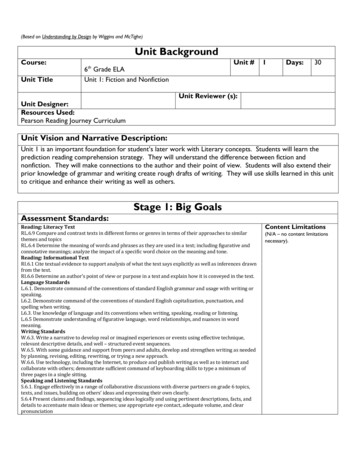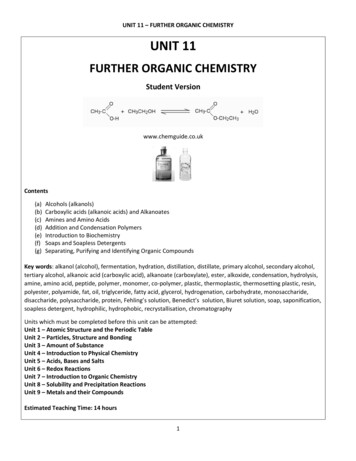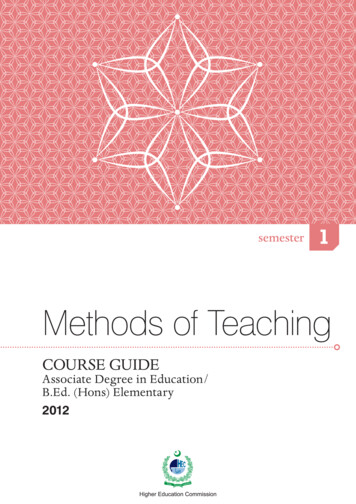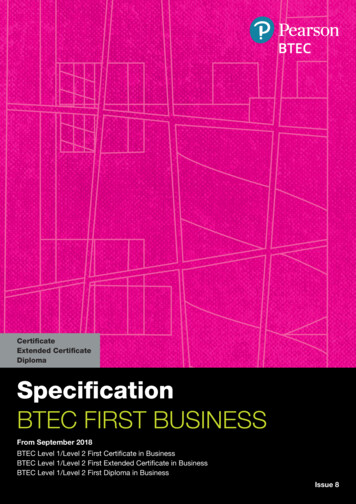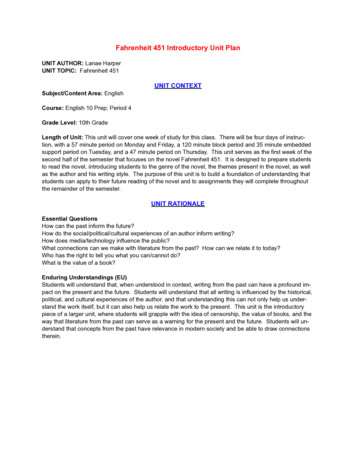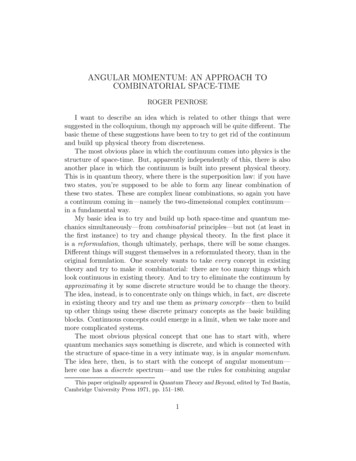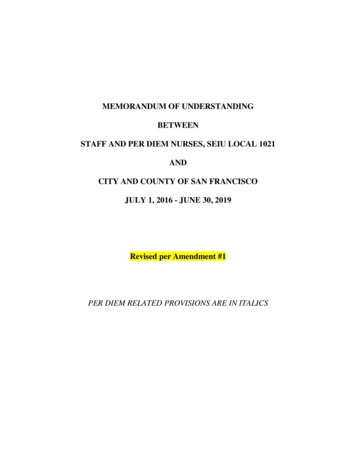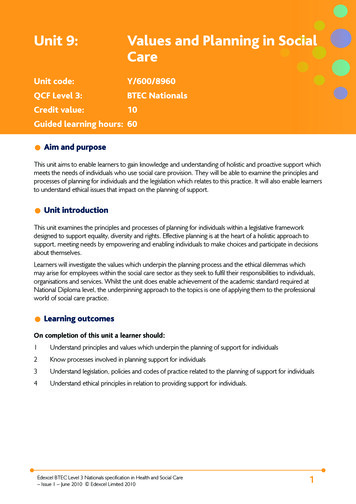
Transcription
Unit 9:Values and Planning in SocialCareUnit code:Y/600/8960QCF Level 3:BTEC NationalsCredit value:10Guided learning hours: 60Aim and purposeThis unit aims to enable learners to gain knowledge and understanding of holistic and proactive support whichmeets the needs of individuals who use social care provision. They will be able to examine the principles andprocesses of planning for individuals and the legislation which relates to this practice. It will also enable learnersto understand ethical issues that impact on the planning of support.Unit introductionThis unit examines the principles and processes of planning for individuals within a legislative frameworkdesigned to support equality, diversity and rights. Effective planning is at the heart of a holistic approach tosupport, meeting needs by empowering and enabling individuals to make choices and participate in decisionsabout themselves.Learners will investigate the values which underpin the planning process and the ethical dilemmas whichmay arise for employees within the social care sector as they seek to fulfil their responsibilities to individuals,organisations and services. Whilst the unit does enable achievement of the academic standard required atNational Diploma level, the underpinning approach to the topics is one of applying them to the professionalworld of social care practice.Learning outcomesOn completion of this unit a learner should:1Understand principles and values which underpin the planning of support for individuals2Know processes involved in planning support for individuals3Understand legislation, policies and codes of practice related to the planning of support for individuals4Understand ethical principles in relation to providing support for individuals.Edexcel BTEC Level 3 Nationals specification in Health and Social Care– Issue 1 – June 2010 Edexcel Limited 20101
Unit content1 Understand principles and values which underpin the planning of support forindividualsPrinciples and values: empowerment of individuals; promotion of choice; promotion of rights; recognitionof preferences; involvement of individuals in planning their support; respect for religious beliefs, moralbeliefs and values; respect for culture; anti-discriminatory practice; holistic approach; working inpartnership, a multi-disciplinary/interagency approach; confidentiality; fulfilling responsibilities2 Know processes involved in planning support for individualsProcesses: the cycle of assessment and planning, referral, assessment of holistic needs and preferences,identification of current provision, implementing, monitoring and reviewing; involvement of keyprofessionals, eg social worker, health visitor, family support worker, probation officer, GP, involvement offamily; advocates, interpreters and translatorsAssessment: tools, eg checklists, diaries of professionals, records of incidents and accidents, use ofappropriate questions, diaries of individuals who use services, observations, personal historiesImplementing support plans: approaches, eg behavioural, task-centred, use of therapeutic groups, use andabuse of power3 Understand legislation, policies and codes of practice related to the planning ofsupport for individualsLegislation: relevant sections from past, present and future legislation, eg Care Standards Act, NationalMinimum Standards, Disability Discrimination Act, Data Protection Act, Freedom of Information Act,Nursing and Residential Care Homes Regulations, Race Relations ActPolicies: organisational policies on, eg health and safety, risk assessment, harm minimisation, equalopportunitiesCodes of practice: General Social Care Council Codes of Practice; organisational codes of practice, codesof practice specific to professional bodies4 Understand ethical principles in relation to providing support for individualsEthical principles: duty; safeguarding individuals; beneficence; social justice; empowerment; autonomy ofthe individual; promotion of dignity, independence, rights of the individual; moral status of the individualEthical dilemmas: potential conflicts, eg rights, responsibilities and duties, balancing services and resources,conflicts of interest between individuals and organisations, individuals and relatives, groups of users ofservices, choices with regard to support regimes, harm minimisation2Edexcel BTEC Level 3 Nationals specification in Health and Social Care– Issue 1 – June 2010 Edexcel Limited 2010
Assessment and grading criteriaIn order to pass this unit, the evidence that the learner presents for assessment needs to demonstrate thatthey can meet all the learning outcomes for the unit. The assessment criteria for a pass grade describe thelevel of achievement required to pass this unit.Assessment and grading criteriaTo achieve a pass grade theevidence must show that thelearner is able to:To achieve a merit grade theevidence must show that, inaddition to the pass criteria,the learner is able to:To achieve a distinction gradethe evidence must show that,in addition to the pass andmerit criteria, the learner isable to:P1explain how the application of M1 review the benefit toD1relevant principles and valuesindividuals and professionalwill enable professionals tostaff, of taking a holisticprovide holistic support forapproach to planning supportindividuals who use socialservices[IE1; CT1; CT2]analyse reasons for workingwith professionals frommore than one agencywhen planning support forindividualsP2identify the processes andM2 describe how three keyassessment tools involvedprofessionals could bein planning support forinvolved in planning supportindividuals with differentfor individualsneeds who use social services[IE4; CT1; CT2]assess potential issueswhich could arise fromthe involvement of severalprofessionals in the planningof support for individuals.P3explain how one piece oflegislation, one policy andone code of practice could beapplied to planning supportfor individuals[IE5; CT5]P4explain how to incorporateethical principles into theprovision of support forindividuals[IE6; CT1; CT2]P5explain why an ethicalapproach may provideworkers with dilemmas.[CT1; CT5]D2M3 justify how an ethicalapproach to providingsupport would benefit theindividuals.PLTS: This summary references where applicable, in the square brackets, the elements of the personal,learning and thinking skills which are embedded in the assessment of this unit. By achieving the criteria,learners will have demonstrated effective application of the referenced elements of the skills.KeyIE – independent enquirersRL – reflective learnersSM – self-managersCT – creative thinkersTW – team workersEP – effective participatorsEdexcel BTEC Level 3 Nationals specification in Health and Social Care– Issue 1 – June 2010 Edexcel Limited 20103
Essential guidance for tutorsDeliveryThe unit should be delivered by a tutor who understands the values, principles and ethics which underpinprovision of support within a health or social care context. Emphasis should be on the practical application oftheory and concepts to everyday issues which occur within the health and social care sectors. Learners willbenefit, from an approach which enables them to understand the need for an ethical approach to basic as wellas complex support, for all individuals who use the services. Although taught input will be necessary, referenceto case studies (perhaps those highlighted in the media) will encourage learners to apply values and principlesto their professional practice. Group discussions around ethical dilemmas will allow learners to explore theirfeelings and challenge prejudice and assumptions within a safe environment. Input from guest speakers withrelevant vocational experience will enhance learning.Learning outcome 1 requires an understanding of the underlying principles and values which underpin theprovision of support in health and social care. Tutors are advised to refer to those which are incorporated inthe codes of practice issued by professional bodies. This also covers the holistic approach to planning support,and learners will need to fully understand the reasoning behind addressing all needs pertaining to the users ofservices, rather than the need presented at referral. Learners must also understand the multi-agency approachto planning and processing support to users of health and social care services. Case studies/examples ofsuccessful delivery should be utilised in order to enhance learner understanding of the issues involved.Learning outcome 2 refers to the assessment tools and processes used when planning the provision ofsupport. Input from guest speakers who are involved with planning support in both the health and social caresectors would enhance learning and add realism to the topic. The use of case studies and copies of supportplans obtained from the internet will also useful. It will also be important to consider how several key peoplemay be involved in delivering support. Examples, real or simulated, will be required to demonstrate how keypersonnel would come together to plan holistic support and the role each would play in this.For learning outcome 3, the full legislative acts do not need to be explored when discussing the legislationrelated to the planning of support for individuals. Learners need to understand the reasons for the legislationand be supported in examining the relevant sections before applying them in their assignments.Learning outcome 4 requires learners to understand ethical principles with regard to health and social care.Tutors could refer to those issued by professional bodies together with relevant case studies drawn from aprofessional magazine. Learners could also draw on examples from the mandatory work experience which ispart of Unit 6: Personal and Professional Development in Health and Social Care, whilst observing measures tosafeguard confidentiality.4Edexcel BTEC Level 3 Nationals specification in Health and Social Care– Issue 1 – June 2010 Edexcel Limited 2010
Outline learning planThe outline learning plan has been included in this unit as guidance and can be used in conjunction with theprogramme of suggested assignments.The outline learning plan demonstrates one way in planning the delivery and assessment of this unit.Topic and suggested assignments/activities and/assessmentUnit introduction.Learning outcome 1Introductory group discussion: principles, ethics and values; group work with case studies.Tutor input: holistic approach to planning support for individuals; question and answer session to checkunderstanding.Assignment 1: Principles and values in health and social care (P1, M1, D1)Using the example of two individuals who uses services, write an explanation, in essay format, of how you wouldapply relevant principles and values, when planning a package of support for these people.Extend your essay to include a review of the benefits to the two individuals and also staff involved in delivery oftaking a holistic approach to planning.Extend your essay to include an analysis of the reasons for working with professionals from more than oneagency when planning support for these two individuals.Learning outcome 2Tutor input: the planning process; groups to work on planning support for a suggested individuals.Guest speaker: a professional involved with planning and delivering support; question and answer session.Tutor input: the assessment tools for planning support; groups to use relevant text/journals to research furtherinformation.Learner research: (internet) on issues arising from an interagency approach to planning support; class discussion.Assignment 2: Planning support for individuals (P2, M2, D2)Produce an information booklet for new social work assistants which; identifies the processes and assessment tools which would be involved when planning support for twoindividuals describes how three key professionals could be involved with this planning assesses two potential issues which could arise from professionals working together.Learning outcome 3Learner research: to obtain information about relevant legislation; tutor-led class discussion, applying thelegislation to practical issues.Tutor input: linking policies with relevant legislation; group activity to check understanding.Learner research: obtain information about codes of practice and their relevance to values and planning ofsupport; followed by tutor-led discussion.Assignment 3: Producing plans (P3)Produce a support plan for each of two individuals within a residential setting for older people. Your plan shouldinclude an explanation of how one piece of legislation, one service policy and one code of practice can beapplied to the support of your chosen individuals.Edexcel BTEC Level 3 Nationals specification in Health and Social Care– Issue 1 – June 2010 Edexcel Limited 20105
Topic and suggested assignments/activities and/assessmentLearning outcome 4Tutor input: defining ethics and ethical principles in health and social care; group discussion to checkunderstanding.Guest speaker: ethical dilemmas in health and social care; question and answer session.Group work: using case studies which include ethical dilemmas; class plenary.Assignment 4: Ethics in health and social care (P4, P5, M3)In essay format, use three examples to explain how you would incorporate ethical principles into provisionof relevant support; explain how an ethical approach would benefit your chosen individuals and evaluate twopotential dilemmas which may be faced by staff involved in delivery.Unit review and assessment.AssessmentThe unit may be assessed in a variety of ways and the following contains suggestions but is not prescriptive.Assessment should enable learners to apply values and principles to vocational issues wherever possibleand the use the of scenarios and case studies would benefit learners. Guidance is necessary if learners wishto produce their own case studies, to ensure an element of realism and maintain confidentiality of subjects.The outline learning plan suggests a set of vocationally-based assignments which involve learners applyingthe principles, values and processes to examples. These could include characters from television soaps, orreferenced cases from professional journals and relevant texts. Learners could base their examples on actualindividuals provided that full confidentiality is maintained and permission is obtained where appropriate.P1 requires learner to explain the principles and values which underpin the delivery of support to twoindividuals. Learners could be given a scenario to base their work on. For M1, learners will need to reviewexactly how both the individuals who use services and the professionals who deliver it benefit from a holisticapproach to planning. This should be written as an extension to P1, demonstrating learner understandingof the links between planning and delivery of support. For D1, learners will need to consider at least threereasons for taking a multi-agency approach to planning support, analysing each one and justifying theirexplanation.P2 asks learners to identify the tools and processes used to assess individuals before planning support. Theassessment process should involve professionals from both health and social care, in order for learners tolink the processes with their description of how three key professionals could be involved in planning supportand demonstrate their understanding of how professionals work together across professional boundaries forboth of the chosen individuals (M2). For D2, learners need to consider the positive and negative aspects ofpotential issues which could arise from the involvement of several professionals in planning support for theindividuals as in M2. For example, professional pride, problems with communication as negatives and use ofexpertise and examples of teamwork as positives. Learners should assess the comparative effects of theseissues on the efficacy of interagency planning.P3 asks for an explanation of the way in which one piece of legislation, one policy and one codes of practiceshould be applied when planning support. Learners must demonstrate their understanding of how supportplans must adhere to the relevant legislation, policies and codes of practice, that is in the way they areconstructed to ensure that delivery also adheres to them.6Edexcel BTEC Level 3 Nationals specification in Health and Social Care– Issue 1 – June 2010 Edexcel Limited 2010
P4 introduces learners to the concept of ethics in health and social care and assessment must explain theincorporation of ethical principles into actual support for individuals. For example, in the daily routines andevents of a health and social care setting. For M3, learners must extend their examination to justify how anethical approach would benefit both individuals; what would be improved because of this approach? P5extends P4 by learners explaining why an ethical approach may cause a dilemma for workers in two differentsituations. It could be suggested that learners use the three examples in P3, to show how dilemmas can arise.Programme of suggested assignments:The table below shows a programme of suggested assignments that cover the pass, merit and distinctioncriteria in the grading grid. This is for guidance and it is recommended that centres either write their ownassignments or adapt any Edexcel assignments to meet local needs and resources.Criteria coveredAssignment titleScenarioP1, M1, D1Principles and values inhealth and social careAs a senior social workEssay.assistant, you are preparingyour application forsecondment to train as asocial worker. You havebeen asked to write an essayon how holistic support isunderpinned by principlesand values.P2, M2, D2Planning support forindividualsYou are a senior socialwork assistant attached toa community centre in aninner city area. You areupgrading the literature fornew staff and have decidedto produce an informationleaflet on planning supportto replace the current onewhich is out of date.P3Producing plansYou are a social workerTwo support plans.attached to a residentialsetting for older people.You have been asked by themanager to contribute to theproduction of support plansfor two new residents byexplaining how legislation,policy and codes of practicecan be applied to planningsupport.P4, P5, M3Ethics in health andsocial careYour tutor has asked youEssay.to write an essay for acompetition on incorporatingethics into health and socialcare. You must also considerthe dilemmas which this mayproduce for staff. There isa prize of 50 for the bestessay.Edexcel BTEC Level 3 Nationals specification in Health and Social Care– Issue 1 – June 2010 Edexcel Limited 2010Assessment methodInformation booklet.7
Links to National Occupational Standards (NOS), other BTEC units, other BTECqualifications and other relevant units and qualificationsThis unit forms part of the BTEC Health and Social Care sector suite (see Appendix A) and has links with unitsfrom other qualifications in that suite. See Appendix E for NOS links and Appendix G for a mapping of the NHSKnowledge and Skills Framework against particular units in this qualification.Essential resourcesLearners will require access to library facilities, including professional journals; magazines, relevant texts,DVDs, CD ROMs, current broadsheet newspapers and ICT facilities.Employer engagement and vocational contextsLearners would benefit from a period of work experience in order to observe the implementation of ethics,principles and values in the practical delivery of support for individuals. Speakers from relevant vocationalsettings, such as day centres for individuals with additional needs and older people, residential settings anddisability living centres, would enhance learning.This unit has close links with Unit 47: Social Policy for Health and Social Care. Learners are also offeredopportunities to achieve Functional Skills ICT and English at Level 2, and personal, learning and thinking skills.Indicative reading for learnersTextbooksAslangul S and Meggitt C – Further Studies for Social Care (Hodder Arnold, 2002) ISBN 9780340804247Holland K and Hogg C – Cultural Awareness in Nursing and Health Care (Hodder Arnold, 2001)ISBN 9780340731338Stretch B and Whitehouse M – BTEC National Health and Social Care Book 2 (Heinemann, 2007)ISBN 9780435499167Stretch B and Whitehouse M – BTEC Level 3 Nationals in Health and Social Care Student Book 1 (Pearson,2010) ISBN 9781846907663Stretch B and Whitehouse M – BTEC Level 3 Nationals in Health and Social Care Student Book 2 (Pearson,2010) ISBN 9781846907470Magazines and newspapersCommunity CareThe Guardian newspaperThe Independent newspaperThe Nursing Times8Edexcel BTEC Level 3 Nationals specification in Health and Social Care– Issue 1 – June 2010 Edexcel Limited 2010
Websiteswww.community-care.co.ukCommunity Care magazinewww.dh.gov.ukDepartment of Healthwww.eoc.org.ukEqual Opportunities ctor Skills Council for Care and Developmentwww.skillsforhealth.org.ukSector Skills Council for the UK Health Sectorwww.society.guardian.co.ukThe GuardianEdexcel BTEC Level 3 Nationals specification in Health and Social Care– Issue 1 – June 2010 Edexcel Limited 20109
Delivery of personal, learning and thinking skillsThe following table identifies the opportunities for personal, learning and thinking skills (PLTS) that have beenincluded within the pass assessment criteria of this unit.SkillWhen learners are Independent enquirers[IE1] relating principles and values to the support of individuals who use services[IE4] identifying the processes and tools involved in the assessment of individualsand planning their support[IE5] applying legislation, policies and codes of practice to support plans forindividuals[IE6] incorporating ethical principles into support for individualsCreative thinkers10[CT1,2,5] describing how to apply legislation, policies and codes of practice tosupport plans; considering how to incorporate ethics into support for individuals;recognising where an ethical approach to support may present workers withdilemmas.Edexcel BTEC Level 3 Nationals specification in Health and Social Care– Issue 1 – June 2010 Edexcel Limited 2010
Functional Skills – Level 2SkillWhen learners are ICT – Use ICT systemsSelect, interact with and use ICT systemsindependently for a complex task to meet avariety of needsselecting a variety of websites for use in assignmentsManage information storage to enableefficient retrievalstoring incomplete work and documents for future useFollow and understand the need for safetyand security practicesstoring work onto a pen drive and using a password for securityICT – Find and select informationSelect and use a variety of sources ofusing a variety of internet sites for their assignmentsinformation independently for a complex taskAccess, search for, select and use ICTbased information and evaluate its fitness forpurposeICT – Develop, present andcommunicate informationBring together information to suit contentand purposePresent information in ways that are fit forpurpose and audienceEnglishSpeaking and listening – make a range ofcontributions to discussions and makeeffective presentations in a wide range ofcontextsReading – compare, select, read andunderstand texts and use them to gatherinformation, ideas, arguments and opinionsWriting – write documents, includingextended writing pieces, communicatinginformation, ideas and opinions, effectivelyand persuasivelylogging on and finding a number of web-based information sitesand evaluating their relevancecombining web-based information in assignmentspresenting essays, information booklets and support planscontributing to group discussions and questioning visiting speakersreading a variety of relevant texts and journals to chooseinformation for inclusion in assessment taskswriting essays and information booklets.Edexcel BTEC Level 3 Nationals specification in Health and Social Care– Issue 1 – June 2010 Edexcel Limited 201011
The unit should be delivered by a tutor who understands the values, principles and ethics which underpin provision of support within a health or social care context. Emphasis should be on the practical application of theory and concepts to everyday issues which occur within the health and social care sectors. Learners will

